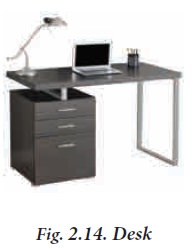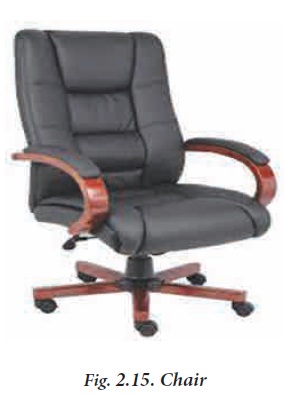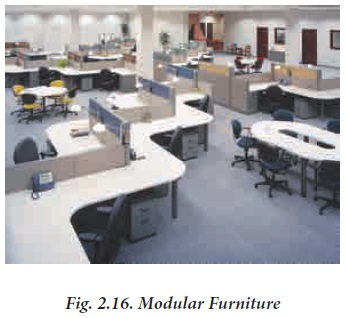Modern Office | Office Management and Secretaryship - Office Furniture, Fittings and Accessories | 11th Office Management and Secretaryship : Chapter 2 : Office Automation
Chapter: 11th Office Management and Secretaryship : Chapter 2 : Office Automation
Office Furniture, Fittings and Accessories
Office Furniture, Fittings and Accessories:
1. Office Furniture:
Office
furniture is necessarily a part of total environment in which the employees
work. Right kind of furniture must be provided so as to provide maximize
comfort
The number and the type of furniture to be purchased for any
office will depend on the number of departments and office workers, the nature
and volume of work to be performed and the office space available for their
accommodation.
2. Fittings and Accessories:
Generally
office fittings include desk lamp, telephone stand, waste paper basket, etc.
When choosing or selecting such items, their colour may be considered, because
the colour of these must not ruin the pleasing atmosphere of the office. Clerks
should be provided with certain accessories in order to perform their work
efficiently. Such items may be pen holders, sorting trays, boxes, cabinets,
etc.
3. Types of Furniture Used in Office:
Every
office requires different types of furniture. Furniture can be classified on
the basis of its physical appearance and the purpose for which it is used. E.g.
Executive furniture, Special purpose furniture,Built-in furniture and General
clerical furniture.
Desk: The performance of an
office employee is very much influenced by the type of
desk he uses. The primary function of any desk is to provide a suitable surface
for writing, checking, sorting and examining. There are different types of
desks for different persons depending upon the nature of work and status. (i).
Executive desk (ii). General purpose desk and (iii) Computer desk.
Executive Desk: These are designed to suit individual tastes and quite often
they are designed as a show piece of an organisation. Their purpose is also to
impress visitors. Sharp edges and corners are eliminated. Table top is covered
with a sheet of glass.

General Purpose Desk: It is a general purpose single pedestal desk with less elaborate design.
Computer Desk: Computer desks are generally standard flat-topped, single
or double pedestal desk with provision for placing keyboard.
Tables: Tables are generally
needed for sorting of mail despatch, for holding meeting of
committees, etc. However, in some office table fitted with drawers and other
devices are still used by clerks for writing purpose.
Chairs: There is a need for
providing the right type of chairs to the office employees
as they spend most part of the day in the office. Chairs meant for computer
operators should have adjustable back rest to enable the user to perform their
work efficiently.

Filing Cabinet: A filing cabinet is a
piece of office furniture usually used to store paper
documents in file folders. The two most common forms of filing cabinets are
vertical files and lateral files. A vertical file cabinet has drawers that
extend from the short side of the cabinet. A lateral file cabinet has drawers
that extend from the long side of the cabinet.
Modular Furniture: Modular furniture is pre-made or readymade furniture which can be used according to the
need and room spacing. It is easy to install and dismantle according to need.
It gives modern look to office. It is also available in various colours and
designs. There are various types of modular furniture
·
Two
in one furniture. This type of furniture has two purposes.
·
Three
in one furniture. This type of furniture has three purposes.

4. Principles in Selecting the Office Furniture:
Following are some of the principles to be considered while selecting office
furniture.
Suitability: The selected furniture
must be suitable for the job. The working area of the
table should be sufficient. It must also have space to keep files (incoming and
outgoing), stationery, etc.
Comfort: The seat of the workers,
shape of the chairs and tables must be so designed
that the workers would not feel any fatigue while doing their jobs. This will
result in efficiency, in turn, more output. The equipment, forms, stationery,
etc., must be within easy reach. Those items frequently used, should be placed
at hand.
Design: Prior to purchase, one
must have an idea of the size, height and design of the
furniture. For example, the size, height, design, number of drawers of the
table should be decided on the basis of work done on it.
There are many designs of tables available in the market. One must decide whether the top of the table should be of polished wood or glass plate or laminate surface. The decision regarding the choice of the furniture, say table, desk, chairs, etc. as to its size and design depends on the officer who uses it.
Durability: Metal furniture is more costly than wooden furniture. But the maintenance charges of
wooden furniture are more than those of the metal furniture. Nowadays, metal
i.e., steel furniture is more popular, because it is more durable than wooden
furniture. Moreover, steel furniture is safe against fire, burglary etc.
Weight: As the business expands,
the size of the office also increases. The existing
layout of the furniture has to be rearranged according to the required comfort.
It may become often necessary to move the furniture from one place to another.
Therefore, it is better to have light weight furniture. If the furniture is
light, there will be less breakage and wear and tear when the furniture is
shifted.
Space saving: Furniture which would occupy minimum space should be selected. The decision regarding the design of the furniture should depend upon the space available in the office and the number of persons who work there.
Cost: The cost of the
furniture should not be neglected when
selecting it. It should be kept within the financial limit.
Hygiene: The outlay of the
furniture should be so made that it will be easy to clean
the furniture as well as the floor underneath it.
Usefulness: The furniture should be selected according to the nature of the particular job. When it is
not needed for the department, it can be easily transferred to another
department, where it may be useful.
Appearance: Furniture should have a good appearance and be pleasing to the eyes. This will impress
the workers and visitors. Wooden furniture looks attractive. Furniture of high
quality wood is durable. It has a warm look and gives comfort to the users.
Many varieties and designs of furniture can easily be made.
Multi-Purpose Uses: Furniture should be adaptable to multi-purpose uses, wherever possible. This
permits standardization in the purchase of multi-purpose desks and enables
office workers to perform more than one type of work with the help of same kind
of furniture.
Related Topics